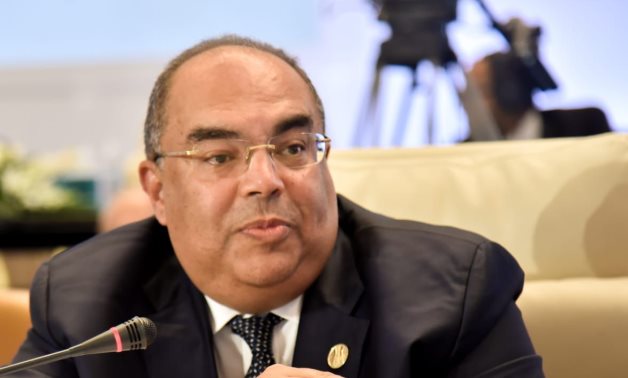
Mahmoud Mohieldin, UN Climate Change High Level Champion for Egypt and the UN Special Envoy on Financing 2030 Sustainable Development Agenda - Press photo
CAIRO - 13 October 2022: Mahmoud Mohieldin, UN High Level Climate Champion for Egypt and UN Special Envoy on Financing 2030 Sustainable Development Agenda, stressed the need for more efforts by the private sector regarding climate finance and providing more solutions to support adaptation measures, especially that there are many countries that depend on rural activities and agriculture and therefore have been affected more than others by the consequences of climate change. This is also in the presence of unfair, inefficient and insufficient funding for these countries.
This came during his speech delivered via video in one of the pre-COP discussions on climate change and poverty within the framework of the pre-COP series organized by the World Bank Group, with the participation of the Minister of International Cooperation, Rania Al-Mashat and Economic Expert Nobel Laureate Esther Duflo.
It is worth noting that Esther Duflo is Professor of Poverty Alleviation and Development Economics at the Massachusetts Institute of Technology (MIT); she is the co-founder and co-director of the Abdul Latif Jameel Poverty Action Lab (J-PAL), which was established in 2003. During that session, Duflo gave a lecture on the relationship between climate change and the rise in poverty rates in light of the consequences of Corona pandemic.
In her speech, Duflo emphasized the importance of taking into account the differences between developing and developed countries in terms of responsibility for emissions and pollution, and the subsequent material and societal burdens. According to Duflo, the greatest responsibility for climate change is on the shoulders of developed and rich countries where The richest 10 percent of people produce half of the world's emissions.
Duflo added that the poorer countries are located in the hottest regions and areas where there is constant increase in average temperatures. Therefore, these repercussions will lead to loss of life and permanent economic and societal impacts.
She also pointed out the need to highlight the financing and technological gap between developing and developed countries at the upcoming climate summit, noting the importance of change in the behavior of individuals and the need to reduce consumption to reduce emissions. On the other hand, Duflo stressed that the climate conference represents a golden opportunity to implement the pledges within a fair climate framework with a focus on adaptation and resilience efforts.
In his speech, the climate champion referred to the recent report by the International Adaptation Centee, which indicated that 11.4 billion euros were spent on adaptation, with only 3 percent coming from the private sector, which requires further efforts in this regard.
With regard to the high rates of poverty and climate change, Mohieldin stressed the need to adopt a holistic approach that enhances climate action within the framework of sustainable development plans, which contributes to reducing poverty rates, praising the social protection programs in Egypt that integrate climate action.
He also referred to his recent visit to India, where officials expressed their strong support for this comprehensive approach.
Meanwhile, the climate champion highlighted the importance of the role that the World Bank can play in the climate finance file by providing concessional financing tools and reducing the cost of borrowing, praising the concessional financing policies of the International Development Agency.
Mohieldin added that these concessional financing policies are not only related to low-income countries, but also to middle-income countries. In another context, the climate pioneer explained that the upcoming climate summit aims at practical application and implementation within the framework of a holistic approach that integrates all dimensions of development

Comments
Leave a Comment